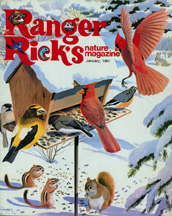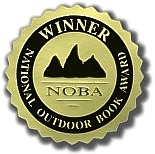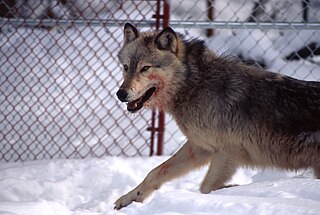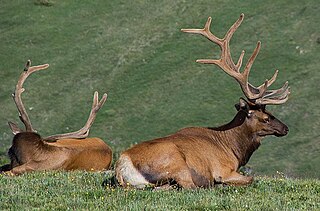Related Research Articles

Moogerah Peaks is a National Park in the Fassifern Valley of South East Queensland, Australia, located approximately 70 km south west of the state capital Brisbane. The 676-hectare park consists of four separate protected areas which surround volcanic peaks and rocky cliffs near Moogerah Dam.

Longs Peak is a high and prominent mountain in the northern Front Range of the Rocky Mountains of North America. The 14,259-foot (4346 m) fourteener is located in the Rocky Mountain National Park Wilderness, 9.6 miles (15.5 km) southwest by south of the Town of Estes Park, Colorado, United States. Longs Peak is the northernmost fourteener in the Rocky Mountains of Colorado and the highest point in Boulder County and Rocky Mountain National Park. The mountain was named in honor of explorer Stephen Harriman Long and is featured on the Colorado state quarter.

Mount Blue Sky is the highest peak in the Mount Evans Wilderness in the Front Range of the Rocky Mountains of North America. The prominent 14,271-foot (4,350 m) fourteener is located 13.4 miles (21.6 km) southwest by south of Idaho Springs in Clear Creek County, Colorado, United States, on the drainage divide between Arapaho National Forest and Pike National Forest.

The National Wildlife Federation (NWF) is the United States' largest private, nonprofit conservation education and advocacy organization, with over six million members and supporters, and 51 state and territorial affiliated organizations (including Puerto Rico and the Virgin Islands).

The Davis Mountains, originally known as Limpia Mountains, are a range of mountains in West Texas, located near Fort Davis, after which they are named. The fort was named for then United States Secretary of War and later Confederate President Jefferson Davis. They are a popular site for camping and hiking and the region includes Fort Davis National Historic Site and Davis Mountains State Park. The historical and architectural value of the fort, alongside the rugged natural environment of the park are a significant destination for tourism in Texas.

Ranger Rick, originally Ranger Rick's Nature Magazine, is a children's nature magazine that is published by the United States National Wildlife Federation. The magazine offers feature articles and activities for children ages 8 and up in order to spark their interest in the outdoors and encourage them to become more actively involved in protecting the environment. The magazine's primary intention is to instill a passion for nature and promote activity outdoors. NWF also publishes two companion magazines, Ranger Rick Jr., which is aimed at ages 4–8, and Ranger Rick Cub, which is aimed at kids 0–4 years old.

The National Outdoor Book Award (NOBA) was formed in 1997 as an American-based non-profit program which each year presents awards honoring the best in outdoor writing and publishing. It is housed at Idaho State University and chaired by Ron Watters. It is sponsored by the National Outdoor Book Awards Foundation, Idaho State University and the Association of Outdoor Recreation and Education. As of 2021, awards have been presented in 13 categories, although not all categories are awarded in any given year.

Robert Michael Pyle is an American lepidopterist, writer, teacher, and founder of the Xerces Society for Invertebrate Conservation. Much of his life story is told in the 2020 feature film The Dark Divide, where Pyle is played by David Cross.

Rainmaker Mountain is the name of a mountain located near Pago Pago, American Samoa on Tutuila Island. Rainmaker Mountain traps rain clouds and gives Pago Pago the highest annual rainfall of any harbor. The average annual rainfall on the mountain is around 200 inches (510 cm). It has a three-pronged summit. Rainmaker Mountain and its base were designated a National Natural Landmark in 1972 due to the slopes’ tropical vegetation.
Swift Communications Inc. is an American digital marketing and newspaper publishing company based in Carson City, Nevada. Swift's primary markets are resort town tabloid newspapers and websites as well as agricultural publications. Swift Communications has been noted for "being outside of the mainstream" and "drawing national attention inside the industry" for disabling commenting and implementing paywalls on most of its online newspaper's websites. Many of Swift's newspapers are heavily composed of paid advertorial "sponsored content".

Wolf reintroduction involves the reintroduction of a portion of grey wolves in areas where native wolves have been extirpated. More than 30 subspecies of Canis lupus have been recognized, and grey wolves, as colloquially understood, comprise nondomestic/feral subspecies. Reintroduction is only considered where large tracts of suitable wilderness still exist and where certain prey species are abundant enough to support a predetermined wolf population.

The Rocky Mountain elk is a subspecies of elk found in the Rocky Mountains and adjacent ranges of Western North America.

Vega State Park is a 1,823-acre (738 ha) Colorado state park in Mesa County, Colorado in the United States. Vega Reservoir is a fishing destination and is located at an elevation of 7,696 feet (2,346 m). Year-round recreational activities at Vega State Park include boating, hiking, snowmobiling and camping. The park was established in 1967 in cooperation with the Bureau of Reclamation which was responsible for the construction of Vega Dam and Vega Reservoir. It is located at the northeast edge of Grand Mesa National Forest in Western Colorado.
Powdr Corporation, stylized as POWDR, is an American privately held company that owns and operates ski resorts in the United States and Canada. It is headquartered in Park City, Utah, and was founded in 1994 by John Cumming, an early investor in the clothing company Mountain Hardwear with his father Ian.

The ecology of the Rocky Mountains is diverse due to the effects of a variety of environmental factors. The Rocky Mountains are the major mountain range in western North America, running from the far north of British Columbia in Canada to New Mexico in the southwestern United States, climbing from the Great Plains at or below 1,800 feet (550 m) to peaks of over 14,000 feet (4,300 m). Temperature and rainfall varies greatly also and thus the Rockies are home to a mixture of habitats including the alpine, subalpine and boreal habitats of the Northern Rocky Mountains in British Columbia and Alberta, the coniferous forests of Montana and Idaho, the wetlands and prairie where the Rockies meet the plains, a different mix of conifers on the Yellowstone Plateau in Wyoming, the montane forests of Utah, and in the high Rockies of Colorado and New Mexico, and finally the alpine tundra of the highest elevations.
Lorrie Otto was an American speaker and author. As an environmentalist, she was an ardent supporter of the protection of biological diversity. She helped to bring about the DDT ban in the United States and helped to establish the Environmental Defense Fund.

Herbert R. Schaal is an American landscape architect, educator, and firm leader notable for the broad range and diversity of his projects, including regional studies, national parks, corporate and university campuses, site planning, botanical gardens, downtowns, highways, cemeteries, and public and private gardens. Schaal is one of the first landscape architects to design children's gardens, beginning in the 1990s with Gateway Elementary, Gateway Middle, and Gateway Michael Elementary school grounds in St. Louis, Missouri, the Hershey Children's Garden at the Cleveland Botanical Gardens, and Red Butte Garden and Arboretum.
The protected areas of the Sierra Nevada, a major mountain range located in the U.S. states of California and Nevada, are numerous and highly diverse. Like the mountain range itself, these areas span hundreds of miles along the length of the range, and over 14,000 feet of elevation from the lowest foothills to the summit of Mount Whitney.
References
- ↑ Family Nature Summits http://www.familysummits.org
- ↑ National Wildlife Federation http://www.nwf.org
- ↑ Robert Michael Pyle http://www.cwu.edu/~geograph/pyle.html Archived 2009-07-14 at the Wayback Machine
- ↑ Jim Halfpenny http://www.tracknature.com/mm5/ Archived 2009-09-13 at the Wayback Machine
- ↑ Clare Walker Leslie http://www.clarewalkerleslie.com/
- ↑ Annie Tiberio Cameron http://www.a-tiberio.com/photography.htm Archived 2009-03-14 at the Wayback Machine
- ↑ Steve Torbit http://www.nwf.org/News-and-Magazines/Media-Center/Faces-of-NWF/Steve-Torbit.aspx
- ↑ Craig Tufts http://blogs.nwf.org/arctic_promise/2009/06/remembering-craig-tufts-nwfs-chief-naturalist.html Archived 2009-07-20 at the Wayback Machine
- ↑ Edward C. Roy, Jr. Award For Excellence in K-8 Earth Science Teaching http://www.agiweb.org/education/awards/ed-roy/